
REVISTA DE LA SOCIEDAD ENTOMOLOGICA ARGENTINA
Scope & Guideline
Empowering Researchers with Accessible Knowledge
Introduction
Aims and Scopes
- Biodiversity and Taxonomy:
Research on the identification, classification, and distribution of insect species, including new species descriptions and taxonomic revisions. - Ecological Interactions:
Studies examining the relationships between insects and their environments, including predation, competition, and symbiosis. - Pest Management and Control:
Research focused on the management of insect pests in agricultural settings, exploring biological control methods and the effects of pesticides. - Insect Physiology and Behavior:
Investigations into the physiological processes and behavioral patterns of insects, including reproduction, foraging, and social structure. - Conservation and Environmental Impact:
Research highlighting the conservation status of insect species and their roles in ecosystems, along with the impacts of human activities on insect populations.
Trending and Emerging
- Molecular and Genetic Studies:
An increasing number of papers are utilizing molecular techniques for species identification, population genetics, and phylogenetic studies, indicating a trend towards integrating molecular biology with entomology. - Impact of Climate Change on Insect Populations:
Research exploring how climate change affects insect distribution, behavior, and ecology is gaining traction, highlighting the urgency of understanding these impacts. - Insect-Vectored Diseases:
There is a growing emphasis on the role of insects as vectors of diseases, particularly in relation to public health and agricultural productivity, reflecting global health concerns. - Sustainable Practices in Agriculture:
Emerging research focuses on sustainable pest management and the role of beneficial insects in agriculture, indicating a shift towards ecological approaches in pest control. - Urban Entomology:
Research on insects in urban environments is on the rise, addressing issues related to biodiversity, pest management, and human-insect interactions in urban settings.
Declining or Waning
- Traditional Agricultural Practices:
Research related to conventional methods of pest control and agriculture has decreased, with a shift towards more sustainable and integrated pest management approaches. - General Insect Behavior Studies:
There has been a noticeable reduction in studies focusing solely on basic insect behavior, as the journal increasingly emphasizes applied research with practical implications. - Historical Entomology:
While historical perspectives on entomology were previously more common, there is a declining trend in papers exploring historical accounts or taxonomic history, as the focus shifts to contemporary issues.
Similar Journals
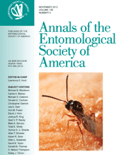
ANNALS OF THE ENTOMOLOGICAL SOCIETY OF AMERICA
Transforming Entomological Research Since 1938ANNALS OF THE ENTOMOLOGICAL SOCIETY OF AMERICA is a premier journal dedicated to advancing the field of insect science, published by Oxford University Press. With an impressive impact factor and classified in the Q1 quartile for its category, this journal ranks among the top publications in agricultural and biological sciences, specifically within insect science, positioned at #28 out of 181, indicating its significant influence and high-quality research contributions. The journal aims to disseminate original research, comprehensive reviews, and groundbreaking findings that enhance our understanding of entomology, spanning across ecological, evolutionary, and applied segments. With a consistent publication history since 1938, researchers, professionals, and students will benefit from the wealth of knowledge presented in its pages. Although the journal does not currently offer open access, it remains a vital resource for those seeking to stay at the forefront of entomological research and innovation.

Austral Entomology
Unveiling the Secrets of Entomological ScienceAustral Entomology, published by Wiley, is a leading journal in the field of entomology, specializing in the study of insects within the wider context of agronomy, ecology, and evolutionary biology. With an impact factor that reflects its growing influence and a commendable H-Index, this journal serves a vital role in disseminating cutting-edge research that bridges the gap between basic entomological studies and applied agricultural practices. Since its inception in 2014, Austral Entomology has maintained a strong commitment to open access, fostering a collaborative environment for researchers and practitioners. Recognized within category quartiles Q2 across multiple fields such as Agronomy and Crop Science and Ecology, it ranks impressively among journals in Insect Science, showcasing the significance of its contributions to understanding insect behavior, ecology, and systematics. Given its robust accessibility options, the journal not only enhances the visibility of entomological research but also empowers professionals and students alike to engage with and apply findings in real-world contexts.
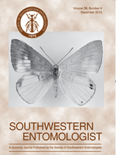
SOUTHWESTERN ENTOMOLOGIST
Pioneering Studies for Ecological and Agricultural ProgressSOUTHWESTERN ENTOMOLOGIST is a pivotal academic journal dedicated to advancing the fields of Agronomy, Ecology, and Insect Science. Published by the SOUTHWESTERN ENTOMOLOGICAL SOC in the United States, this journal plays a crucial role in disseminating vital research findings that address pressing ecological and agricultural challenges. With its ISSN 0147-1724 and E-ISSN 2162-2647, the journal has been publishing comprehensive studies since 1993 and continues to contribute significantly to the knowledge base up to 2024. As a Q4 ranked journal in both Agronomy and Crop Science and Ecology, as well as Insect Science, it provides an inclusive platform for researchers and students to share their insights and foster collaborations. Although it currently does not offer open access options, the content is accessible to academic institutions and professionals, ensuring that significant findings reach a broad audience. Given its niche focus, SOUTHWESTERN ENTOMOLOGIST not only appeals to researchers and students but also to professionals looking to stay updated on the latest trends and developments in entomology and its related fields.

Insects
Bridging Gaps in Insect Research and ApplicationInsects is a prominent open-access journal published by MDPI, dedicated to advancing research in the vibrant field of insect science. Since its inception in 2011, this journal has become a vital resource for academics and professionals alike, also ranked in the prestigious Q1 category within the Insect Science field by Scopus, achieving a remarkable rank of 26 out of 181 journals. With an ongoing convergence period from 2010 to 2024, Insects provides comprehensive coverage of various aspects of entomology, including but not limited to ecology, behavior, physiology, and applied entomology. Based in Switzerland, the journal promotes an open-access model, ensuring that vital research is readily available to researchers, practitioners, and students globally. This journal not only facilitates the dissemination of groundbreaking entomological research but also fosters collaboration and interdisciplinary dialogue in the field.
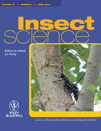
Insect Science
Elevating the impact of insect science on global ecosystems.Insect Science, published by WILEY, stands as a prestigious journal in the realms of Agronomy, Biochemistry, Genetics, and Insect Ecology. The journal, with ISSN 1672-9609 and E-ISSN 1744-7917, has firmly established itself as a significant resource for researchers and professionals seeking to explore the intricate dynamics of insects and their crucial roles in ecosystems. With a remarkable impact factor placing it in the Q1 quartile across multiple categories, including Ecology and Evolution and Agronomy and Crop Science, Insect Science ranks impressively at #8 out of 181 in the realm of Insect Science on Scopus, showcasing its influence and relevance in the field. Spanning its coverage from 1994 to 2024, this journal invites contributions that advance our understanding of insect biology, behavior, and their interactions within agricultural contexts. The commitment to high-quality research and its role in fostering interdisciplinary dialogue make Insect Science an essential platform for scholars and practitioners at the forefront of insect-related studies.
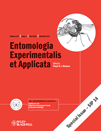
ENTOMOLOGIA EXPERIMENTALIS ET APPLICATA
Pioneering research for a deeper understanding of insects.ENTOMOLOGIA EXPERIMENTALIS ET APPLICATA is a premier journal dedicated to advancing the understanding of insect science through innovative research and thorough experimental methodologies. Published by Wiley, this esteemed journal has been at the forefront of entomology since its inception in 1958, with its latest convergence extending until 2024. With a commendable Impact Factor and categorically positioned in the Q2 quartile across both Ecology, Evolution, Behavior and Systematics and Insect Science fields, it plays a pivotal role in the dissemination of critical findings. The journal is indexed in Scopus, ranking 43rd out of 181 in Insect Science, showcasing its relevance and stature within the academic community, while maintaining a robust visibility among scholars. Given its rigorous peer-review process and a commitment to quality and innovation, ENTOMOLOGIA EXPERIMENTALIS ET APPLICATA serves as a vital resource for researchers, professionals, and students aiming to deepen their insights into entomological research.

Frontiers in Insect Science
Advancing the Insect Science FrontierFrontiers in Insect Science is a pioneering open-access journal dedicated to the advancement of knowledge in the field of insect science. Published by FRONTIERS MEDIA SA in Switzerland, this journal serves as a vital platform for researchers, professionals, and students to disseminate high-quality, peer-reviewed research spanning diverse topics within insect biology, ecology, and pest management. Since its establishment in 2021, the journal has gained recognition, ranking in the Q2 category of Insect Science with a Scopus ranking of #92 out of 181 in the field. With a commitment to promoting open access and collaboration, Frontiers in Insect Science is instrumental in fostering innovative research and practical applications essential for combating biodiversity loss and enhancing agricultural sustainability. As a freely accessible resource, it invites contributions that impact both fundamental and applied insect research, connecting a global network of scholars eager to explore the fascinating world of insects.
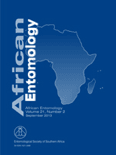
AFRICAN ENTOMOLOGY
Pioneering Research in Agricultural and Ecological EntomologyAFRICAN ENTOMOLOGY, published by the Entomological Society of Southern Africa, is a pivotal journal dedicated to the vibrant field of entomology and its related disciplines. With an ISSN of 1021-3589 and an E-ISSN of 2254-8854, it serves as an essential resource for researchers, professionals, and students interested in the intricacies of insect science across diverse ecological and agricultural landscapes. This journal, with a convergence of publications from 1994 to 2024, holds notable rankings, notably placing in Q2 for Agronomy and Crop Science and Q3 for both Ecology, Evolution, Behavior and Systematics and Insect Science as of 2023. The journal has made significant contributions to the knowledge and understanding of insect populations, their behaviors, and interactions within ecosystems, making it highly relevant for those engaged in agricultural practices and biodiversity conservation. AFRICAN ENTOMOLOGY welcomes original research articles, reviews, and special issues that broaden the dialogue surrounding entomological studies, and while it operates under conventional access policies, it remains an influential platform for scholarly discourse in Southern Africa and beyond.

REVISTA COLOMBIANA DE ENTOMOLOGIA
Empowering Entomologists with Groundbreaking ResearchREVISTA COLOMBIANA DE ENTOMOLOGIA, published by the SOC COLOMBIANA ENTOMOLOGIA-SOCOLEN, serves as a vital platform for disseminating research in the field of insect science. With an ISSN of 0120-0488, the journal has established itself as a key resource for entomologists, agricultural scientists, and biodiversity researchers, focusing on the ecology, taxonomy, and behavior of insects within the Colombian context and beyond. Despite its Q4 ranking in 2023, REVISTA COLOMBIANA DE ENTOMOLOGIA strives to enhance its impact within the academic community, offering a space for innovative studies and reviews that aim to advance the understanding of insect-related phenomena. As a publication addressing critical concerns in agricultural and biological sciences, it invites contributions that explore new methodologies and findings relevant to the insect world. Although it does not currently offer Open Access options, the journal's growth from 2004 to 2024 reflects its commitment to evolving with the needs of its readership and contributors, making it an essential reference point for students and professionals alike interested in entomological research.
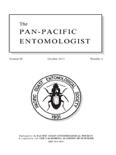
PAN-PACIFIC ENTOMOLOGIST
Celebrating the Vital Roles of Insects in NaturePAN-PACIFIC ENTOMOLOGIST, published by the PACIFIC COAST ENTOMOLOGICAL SOCIETY, serves as a pivotal platform for disseminating research in the field of entomology, encompassing a variety of topics related to insects and their interactions within ecosystems. Operating under the ISSN 0031-0603 and E-ISSN 2162-0237, this esteemed journal has been committed to advancing our understanding of insect science since its initial publication in 1993, with coverage extending to 2024. Notably categorized in the Q4 quartile of the insect science category and ranked in the 5th percentile of Scopus, PAN-PACIFIC ENTOMOLOGIST offers a unique opportunity for scholars, professionals, and students to engage with cutting-edge research and contribute to the scientific dialogue within this specialized field. While currently not open access, the journal is dedicated to the dissemination of empirical studies, reviews, and short communications that elucidate the crucial roles insects play in agriculture, ecology, and public health. Situated in the heart of San Francisco, California, this journal not only enriches the academic community but also promotes a deeper appreciation for the diverse and often under-appreciated world of entomology.